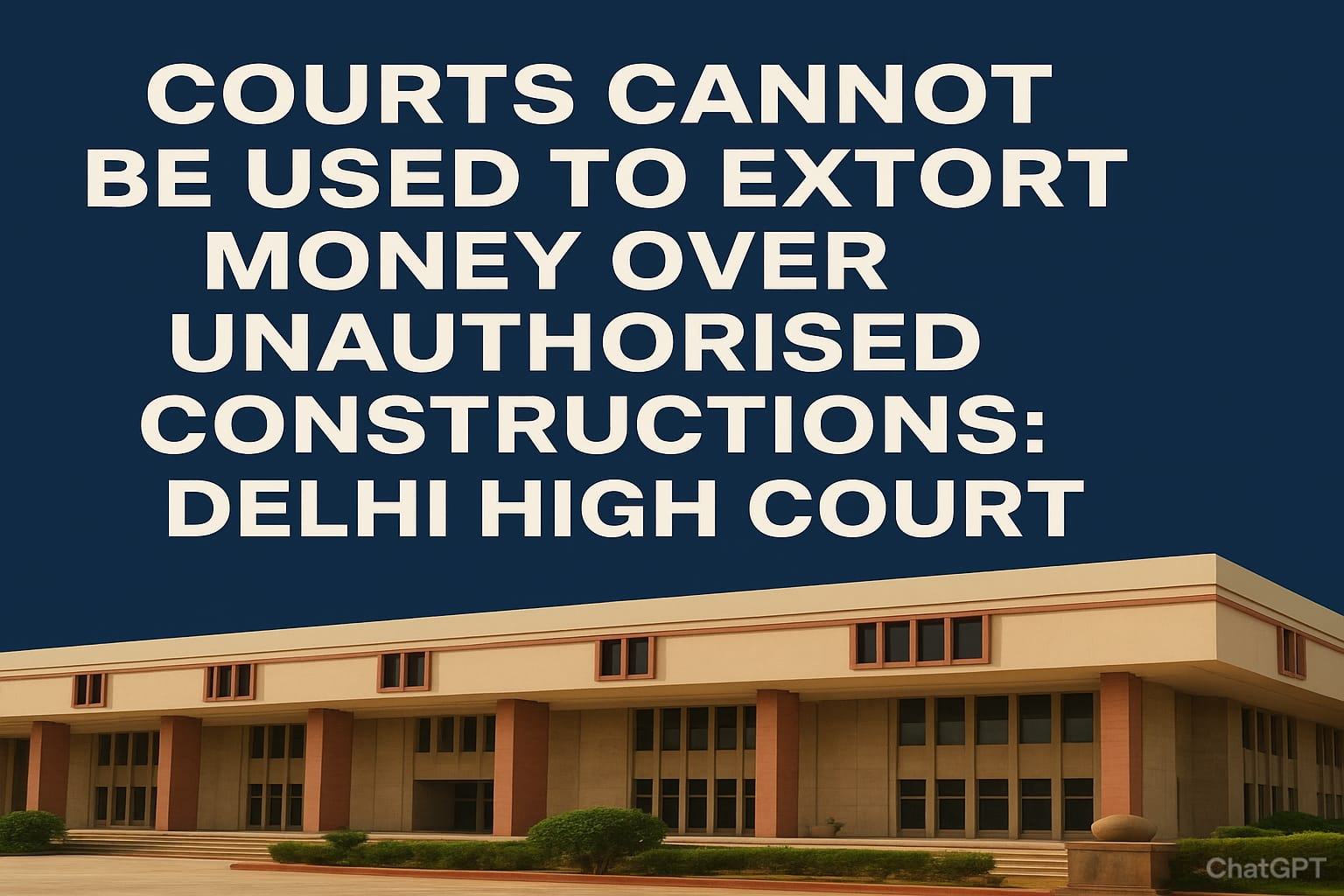Courts Cannot Be Used to Extort Money Over Unauthorized Constructions: Delhi High Court
Introduction
Property disputes in Delhi are nothing new. From illegal construction in urban colonies to disputes over ownership rights, the capital city has witnessed a steady stream of litigation in courts. On one hand, authorities like the Municipal Corporation of Delhi (MCD) and the Delhi Development Authority (DDA) are entrusted with maintaining law and order in construction activities. On the other, individuals often approach the Delhi High Court with writ petitions, either seeking justice against unauthorized construction or, sometimes, using the judicial system as a tool for ulterior motives.
The Delhi High Court judgment in W.P.(C) 12079/2025, Aalim v. Municipal Corporation of Delhi & Ors., decided on 12th August 2025, throws light on these pressing issues. The case revolved around a writ petition filed by one Aalim, demanding demolition of illegal construction in Jamia Nagar. However, as the Court dug deeper, it uncovered a disturbing pattern—multiple petitions filed by different people against the same property, allegedly for the purpose of extortion and blackmail.
This blog unpacks the judgment in detail, highlights the legal issues at play, and reflects on the broader implications for property disputes, real estate law, and urban governance in Delhi.
Background of the Case
The petitioner, Aalim, filed a writ petition under Article 226 of the Constitution of India, seeking directions to the MCD and other authorities to demolish alleged illegal construction raised by private respondents (6 to 8) at property No. S-2/A14, Khasra No. 519/258, Joga Bai Extension, Jamia Nagar, Okhla, New Delhi.
At first glance, this appeared to be a classic case of unauthorized construction in Delhi—an issue that has plagued areas like Jamia Nagar, Shahdara, and other urban localities. But soon, deeper questions arose:
- The petitioner was not even a resident of Delhi. His address showed Amroha, Uttar Pradesh, raising doubts about his connection to the locality.
- This was the third petition regarding the same property. Earlier, two petitions had been filed—one by Fatima Bi and another by Afsana—but they were never pursued.
- The private respondents (the alleged builders) alleged that these repeated petitions were being filed as part of an extortion racket, to blackmail them during construction.
Thus, the case was not merely about construction; it was about the abuse of legal process for unlawful financial gain.
Key Legal Issues Before the Court
1. Was the construction in Jamia Nagar unauthorized, and if so, what action had the MCD taken?
2. Did the petitioner have any genuine locus standi (legal standing) to file the case, considering he was not a resident of Delhi?
3. Were multiple petitions being filed by different individuals against the same property as a strategy to extort money?
4. How should the Court balance the need to stop unauthorized construction with the need to prevent misuse of the judicial process?
Court’s Observations
1. MCD’s Action Against Unauthorized Construction
The Municipal Corporation of Delhi submitted that
- A Show Cause Notice had been issued on 20th May 2025.
- A Demolition Order followed on 13th June 2025.
- Part demolition was already carried out on 10th July 2025, and further action was scheduled for 4th September 2025.
This showed that the authorities were not passive—they had already initiated proceedings against the alleged illegal building construction in Delhi.
2. Petitioner’s Lack of Connection
The Court noted that the petitioner, Aalim, belonged to Amroha, Uttar Pradesh, and had no residence or direct connection with the locality in Jamia Nagar. This raised doubts about his intentions.
His affidavit too did not reflect that he was present in Delhi at the time of signing. Thus, the Court questioned his locus standi, or the right to bring the petition.
3. Pattern of Multiple Petitions – Extortion Angle
The Court observed:
- Similar petitions had earlier been filed by Fatima Bi and Afsana, but were never pursued
- This was the third petition against the same property.
- The private respondents alleged that they had been receiving extortion calls linked to these petitions.
The Court strongly deprecated this practice, recognizing it as a misuse of the judicial process.
4. Balancing Two Competing Concerns
Justice Mini Pushkarna highlighted a crucial balance:
- On one hand, unauthorized construction in Delhi must be acted against strictly.
- On the other hand, courts cannot become tools for blackmail and extortion.
This dual recognition reflects the Court’s nuanced approach—ensuring compliance with urban planning laws while safeguarding the integrity of the judicial system.
Final Decision of the Court
The Delhi High Court ultimately held:
- Since the MCD had already taken action against the unauthorized construction, no further directions were needed.
- However, to address the allegations of extortion, the Court directed the Deputy Commissioner of Police (South East), Sarita Vihar, to investigate
Why multiple petitions were being filed against the same property.
The antecedents of the petitioner.
The extortion allegations made by respondents 6 to 8.
- The DCP was ordered to submit a Status Report within four months (by December 2025).
Thus, the petition was disposed of, but not without stern warnings against misuse of legal remedies.
Broader Implications of the Judgment
1. Unauthorized Construction in Delhi – A Widespread Problem
From unauthorized floors in residential colonies to commercial encroachments, Delhi has long struggled with illegal real estate development. This judgment reinforces that authorities like MCD and DDA must act swiftly, but also fairly, to prevent such violations.
2. Misuse of Writ Petitions for Extortion
The case is a reminder that litigation can be weaponized. Filing repeated petitions without genuine connection to the property can become a means of extortion, blackmail, or harassment. Courts are becoming increasingly aware of this misuse.
3. Locus Standi in Property Disputes
The judgment emphasizes that not everyone has the right to file petitions in property matters. Legal standing (locus standi) requires genuine interest or connection. This principle prevents frivolous or malicious litigation.
4. Role of Judiciary in Maintaining Balance
The judiciary must strike a delicate balance—protecting citizens from unauthorized construction while ensuring that legal remedies are not hijacked by vested interests. This judgment reflects precisely that balance.
Practical Takeaways for Property Owners and Residents
If You’re Facing Unauthorized Construction Nearby:
- Gather Evidence: Take photographs, collect documents, and file complaints with MCD or DDA.
- Approach Authorities First: Exhaust remedies with municipal bodies before moving to court.
- File a Genuine Petition: If authorities fail, a writ petition under Article 226 can be filed, but ensure you have legal standing.
If You’re Accused of Unauthorized Construction:
- Check Compliance: Ensure building plans and permissions are valid.
- Respond to Notices: Take MCD notices seriously and reply within timelines.
- Beware of Extortionists: If facing blackmail through frivolous petitions, bring it to the Court’s and police’s attention
Conclusion
The Delhi High Court judgment in W.P.(C) 12079/2025 (Aalim v. MCD & Ors.) is more than just another property dispute ruling. It’s a reflection of two parallel realities in Delhi’s urban landscape:
- The real problem of unauthorized construction.
- The emerging misuse of the judicial process for extortion and harassment.
Justice Mini Pushkarna’s order sends a clear message—illegal construction will not be tolerated, but neither will the courts allow themselves to be used as instruments of blackmail.
For ordinary residents and property owners, the judgment underlines the importance of using legal remedies responsibly. For the legal system, it reinforces the need to ensure that justice remains a shield for the oppressed, not a sword for the opportunist.
Disclaimer:
This content is for educational and general informational purposes only. It should not be considered as legal advice. Please consult a qualified lawyer before making any legal decisions


